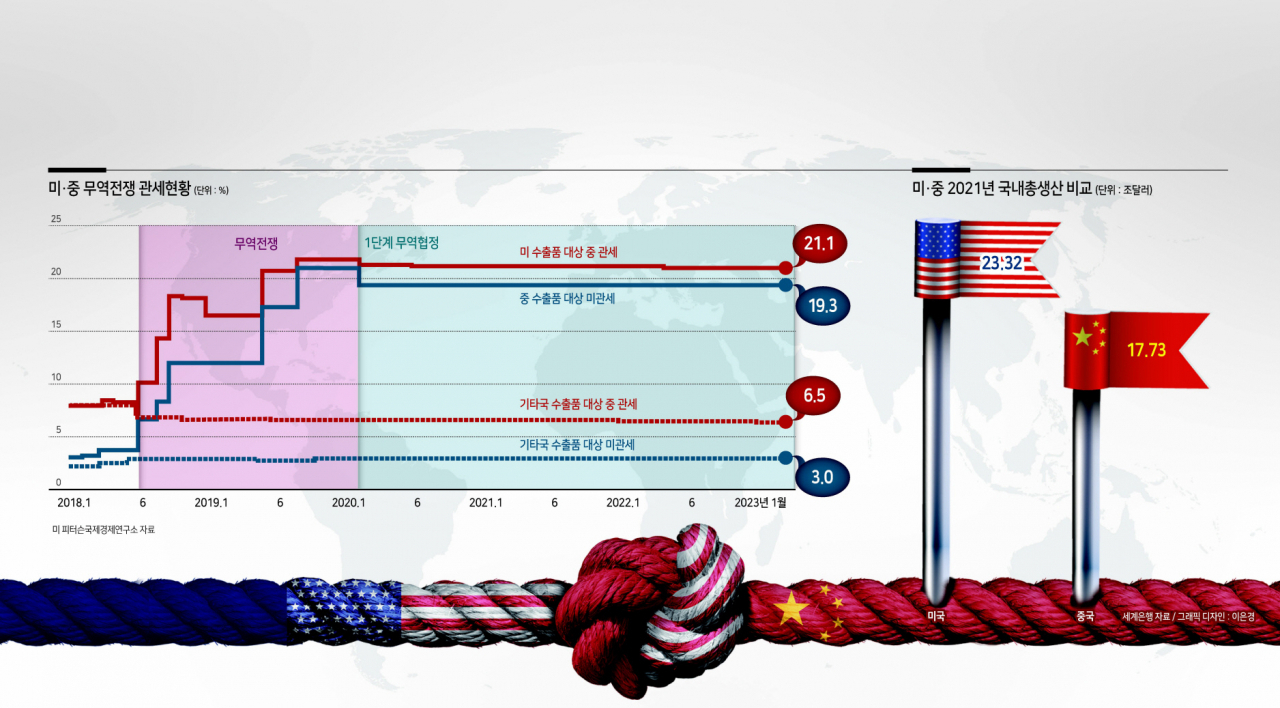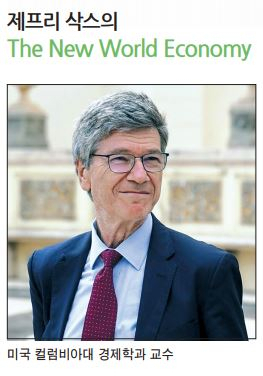이 기사는 해외 석학 기고글 플랫폼 '헤럴드 인사이트 컬렉션'에 게재된 기사입니다.


미국 외교정책의 기저에는 내재적인 모순과 치명적인 결함이 있다. 미국 외교정책은 미국 지배의 세계를 목표로 한다. 그 세계에서는 미국이 글로벌 무역과 금융의 규칙을 세우고 선진기술을 통제하며 군사적 패권을 유지하고 모든 잠재적 경쟁자 위에 군림한다. 다극적 세계의 필요성을 인정하는 방향으로 변화하지 않는 한, 미국 외교정책은 더 많은 전쟁, 그리고 제3차 세계대전까지도 몰고 올 수 있다.
미국 외교정책의 내재적 모순은 그것이 유엔 헌장과 충돌한다는 데 있다. 유엔 헌장은 미국(그리고 그 외 모든 유엔 회원국)이 어느 한 국가에 의해 지배되지 않는 유엔 기구들을 기반으로 한 국제적 시스템을 따르도록 요구한다. 미국의 치명적 결함은 미국이 세계 인구의 단 4%만을 차지하며, 나머지 96%를 지배하기에는 경제·금융·군사 및 기술 역량이 부족하고, 윤리적·법률적 자격은 훨씬 더 부족하다는 사실이다.
제2차 세계대전 말 미국은 경제력, 기술력, 군사력에서 훨씬 앞서 있었다. 그러나 많은 나라가 독자적인 경제와 기술적 역량을 구축해 온 결과, 이는 더 이상 사실이 아니다.
에마뉘엘 마크롱 프랑스 대통령은 최근 유럽연합(EU)이 미국의 동맹이지 속국이 되고 싶지는 않다며 진실이 담긴 발언을 했다. 유럽의 많은 얼치기(mediocre) 정치인들은 미국의 정치적 후원에 의존해 권력을 유지하고 있기 때문에 마크롱 대통령의 발언은 미국과 유럽 모두에서 많은 지탄을 받았다.
2015년 미국 외교정책의 중요한 전략가인 로버트 블랙윌 전 미국대사가 미국의 ‘대전략(Grand Strategy)’을 아주 명확하게 설명한 적이 있다. 그는 “미국은 건국 이래 처음에는 북미 대륙, 그다음에는 서반구, 그리고 마지막으로는 전 세계에 걸친 다양한 적들에 대해 우위를 점하고 유지하는 것에 초점을 맞춘 대전략을 일관되게 추구해 왔다”고 기술했다. 그는 또 “글로벌 시스템에서 미국의 우위(primacy)를 유지하는 것이 21세기에도 여전히 미국 대전략의 중심 목표여야 한다”고 주장했다.
블랙윌은 중국을 상대로 미국의 우위를 지키기 위한 전략을 제시했고, 이를 현재 조 바이든 미국 대통령이 따르고 있다. 여러 가지 수단 중에서도 특히 블랙윌은 미국이 의식적으로 중국을 배제시키는 수단을 통해 미국의 우방 및 동맹국들의 상호 이익을 증진시킬 수 있도록 우방 및 동맹국 간의 새로운 특혜무역협정을 마련하고, 중국의 전략적 역량을 차단하기 위한 ‘기술 통제 체제’를 구축해야 한다고 했다. 아울러 중국 주변부에 있는 미국의 우방 및 동맹국들의 권력 정치(power politics) 역량을 증진하고, 중국의 반대에 맞서 아시아의 주변국들(rimlands)에서 미국의 군사력을 강화시킬 것을 주문했다.
대부분의 미국 정치인, 그리고 영국, EU, 일본, 한국, 호주, 뉴질랜드의 다수 정치인이 이러한 미국의 공격적인 태도를 지지한다. 나는 그렇지 않다. 중국에 대한 미국의 이런 접근이 유엔 헌장과 평화에 반한다고 생각한다.
중국은 자국 국경 주변에서 일어나는 미국의 각종 도발에서 벗어나 번영과 국가 안보를 이룰 권리가 있다. 1970년대 말 이후 중국의 비약적인 경제적 성취는 중국과 세계 모두에 훌륭한 일이었다.
1839년부터 1949년까지 긴 한 세기 동안 중국은 유럽과 일본의 중국 침략, 그리고 내전들을 거치며 극심한 빈곤에 빠지게 됐다. 1839년 중국을 침략한 영국은 자신들이 가져온 중독성 아편을 중국에 강매했다. 이후 한 세기 동안 다른 열강들이 합세했다. 마침내 중국은 이 불행한 시기를 극복했고 그 과정에서 1억명에 가까운 사람들이 가난을 벗어났다.
중국의 새로운 번영은 세계에 평화와 생산성 모두를 선사할 수 있다. 말라리아 필수 치료제에서 저렴한 태양 에너지, 효율적인 5세대(G) 네트워크에 이르기까지 중국의 성공적인 기술들은 세계에도 요긴할 것이다. 미국이 중국을 적으로 만드는 만큼, 중국은 위협이 될 것이다. 남들보다 우위에 서겠다는 미국의 오만한 목표와 19세기까지 거슬러 올라가는 뿌리 깊은 반(反)중국 인종차별주의가 뒤섞여 만들어진 중국에 대한 미국의 적대감은 적을 만들어 내고 있다.
나는 한국(그리고 일본)이 이 모든 것에서 중요한 교훈과 기회를 찾을 수 있다고 생각한다. 중국의 부상은 일본과 한국을 비롯한 동아시아 전체에 이익이다. 중국, 일본, 한국 사이에 오래된 적개심과 안보 현안들이 존재하지만, 3국은 평화롭게 함께 번영할 수 있고, 그래야만 한다. 세 나라는 재생에너지, 교통, 디지털 서비스, 로봇공학 등 지속 가능한 기술에 있어 세계에서 가장 진보된 제조 중심지다. 이들의 경제는 이미 서로 깊이 얽혀있다. 셋이 힘을 합친다면 세계의 지속 가능한 발전을 증진하는 데 핵심적인 역할을 할 수 있다.
따라서 중국의 부상을 ‘억제’하려는 미국의 시도는 한국을 비롯한 아시아 국가들에 어떤 이익도 되지 않는다. 미국은 일본과 한국을 중국에 대항한 최전방 국가로 삼고 싶어 하지만 아시아의 실익은 또 다른 분열의 시대를 막는 것이다. 미국의 현 외교정책이 유지된다면 아시아는 냉전은 물론 어쩌면 우크라이나의 전철을 밟아 무력전쟁도 겪게 될 것이다. 미국은 중국에 대한 반대를 천명함으로써 아무 이유 없이 적을 만들고 모든 주변국을 불신과 노골적인 갈등으로 끌어들이겠다고 위협하고 있다.
미국 외교정책의 위험성은 당연히 중국과 아시아를 훨씬 넘어선다. 북대서양조약기구(NATO·나토)를 우크라이나와 조지아로 확대하고 러시아를 흑해에서 고립시키겠다는 미국의 목표는 우크라이나 전쟁을 촉발하는 데 일조했다. 지금까지도 미국은 나토의 확장이 러시아 입장에서 분명한 레드 라인이며 현재 갈등의 주된 원인임에도 이를 계속 추진하고 있다.
이제 수많은 국가가 미국식 접근법의 위험성을 깨닫고 있다. 브라질, 인도, 그리고 더 많은 주요 국가가 다극화된 세계를 지향하고 있다. 이 국가들은 미국이 군사적, 기술적 우위를 추구하기보다 협력과 협상, 대화를 기반으로 한 다른 방식을 택하도록 독려해야 한다.
가장 중요한 것은 모든 유엔 회원국이 유엔 헌장을 다시금 되새기고 어떤 국가든 우위를 주장하는 국가가 있다면 그에 반대해야 한다는 것이다. 패권국들의 시대는 지났다. 지금은 전 세계적 협력이 우리의 생존에 가장 중요한 열쇠인 지속 가능한 개발의 시대다.
제프리 삭스 미국 컬럼비아대 교수
The Need for a New US Foreign Policy
Jeffrey D. Sachs
US foreign policy is based on an inherent contradiction and fatal flaw. The aim of US foreign policy is a US-dominated world, in which the US writes the global trade and financial rules, controls advanced technologies, maintains militarily supremacy, and dominates all potential competitors. Unless US foreign policy is changed to recognize the need for a multipolar world, it will lead to more wars, and possibly World War III.
The inherent contradiction in US foreign policy is that it conflicts with the UN Charter, which commits the US (and all other UN member states) to a global system based on UN institutions in which no single country dominates. The fatal flaw is that the US has just 4 percent of the world population, and lacks the economic, financial, military, and technological capacities, much less the ethical and legal claims, to dominate the other 96 percent.
At the end of World War II, the US was far ahead in economic, technological, and military power. This is no longer the case, as many countries have built their economies and technological capacities.
President Emmanuel Macron recently spoke the truth when he said that the European Union, though an ally of the US, does not want to be a vassal of the US. He was widely attacked in the US and Europe for uttering this statement because many mediocre politicians in Europe depend on US political support to stay in power.
In 2015, US Ambassador Robert Blackwill, an important US foreign policy strategist, described US grand strategy with exceptional clarity. He wrote, “Since its founding, the United States has consistently pursued a grand strategy focused on acquiring and maintaining preeminent power over various rivals, first on the North American continent, then in the Western hemisphere, and finally globally,” and argued that “preserving U.S. primacy in the global system ought to remain the central objective of U.S. grand strategy in the twenty-first century.”
To sustain US primacy vis-à-vis China, Blackwill laid out a game plan that President Joe Biden is following. Among other measures, Blackwill called on the US to create “new preferential trading arrangements among U.S. friends and allies to increase their mutual gains through instruments that consciously exclude China,” “a technology-control regime” to block China’s strategic capabilities, a build-up of “power-political capacities of U.S. friends and allies on China’s periphery,” and strengthened U.S. military forces along the Asian rimlands despite any Chinese opposition.
Most US politicians and many in Britain, the EU, Japan, Korea, Australia, and New Zealand support the United States’ aggressive approach. I do not. I view the US approach to China as contrary to the UN Charter and peace.
China has the right to prosperity and national security, free from US provocations around its borders. China’s remarkable economic accomplishments since the late 1970s are wonderful for both China and the world.
During the long century from 1839 to 1949, China was driven into extreme poverty in a period marked by European and Japanese invasions of China and Chinese civil wars. Britain invaded in 1839 to force China to buy Britain’s addictive opium. Other powers piled on during the following century. China has finally recovered from that disastrous period, and in the process, ended poverty of around 1 billion people!
China’s new prosperity can be both peaceful and productive for the world. China’s successful technologies – ranging from vital cures for malaria to low-cost solar power and efficient 5G networks – can be a boon for the world. China will be a threat to the extent that the US makes China into an enemy. US hostility to China, which mixes the arrogant US aim of dominance with long-standing anti-Chinese racism dating back to the 19th century, is creating an enemy.
There is, I believe, an important lesson and opportunity for Korea (and Japan) in all of this. China’s rise is of benefit to East Asia as a whole, including Japan and Korea. Even though there are ancient enmities and current challenges of security among the three nations, China, Japan, and Korea can and should prosper peacefully together. The three nations constitute the world’s most advanced manufacturing hub for sustainable technologies – renewable energy, sustainable transport, digital services, robotics, and more. Their economies are already deeply intertwined. Working together, the three nations can play a vital role in promoting global sustainable development.
Thus, America’s attempt to “contain” China’s rise is of no benefit whatsoever to Korea and the rest of Asia. While the US wants to enlist Japan and Korea as frontline nations in opposition to China, the real interests of Asia are to avoid another era of divisions. Current US foreign policy guarantees a cold war in Asia and perhaps a hot one as well, following the same awful trajectory that occurred in Ukraine. By declaring its opposition to China, the US creates an enemy for no reason, and threatens to draw all neighboring countries into a spiral of distrust and even open conflict.
The dangers of US foreign policy obviously extend far beyond China and Asia. The US goal to expand NATO to Ukraine and Georgia, thereby surrounding Russia in the Black Sea, helped stoke the Ukraine War. Even today, the US continues to push NATO enlargement, though it is a clear redline to Russia, and the main reason for the ongoing conflict.
Countless nations now see the danger of the US approach. Major nations from Brazil to India and beyond aim for a multipolar world. These countries should encourage the US to adopt a different approach, one based on cooperation, negotiation, and dialogue, rather than on the quest for military and technological dominance.
Most importantly, all UN member states should recommit to the UN Charter and oppose claims of dominance by any nation. We are past the age of hegemons. We are in the age of sustainable development, when global cooperation has become the most important key to our survival.








